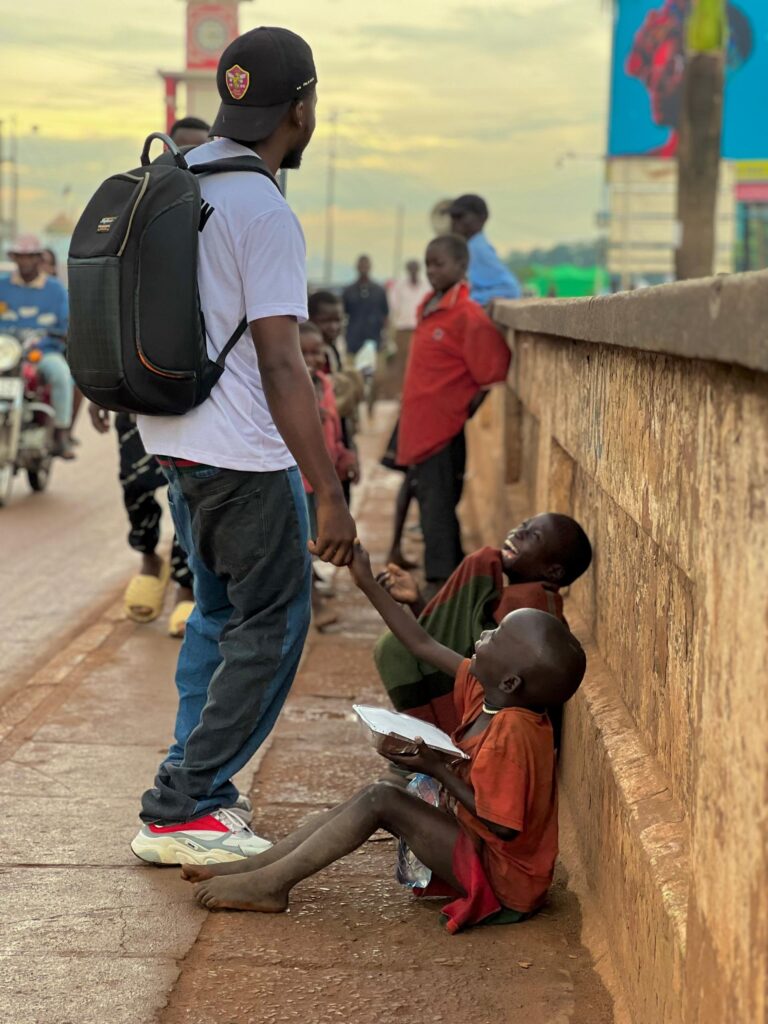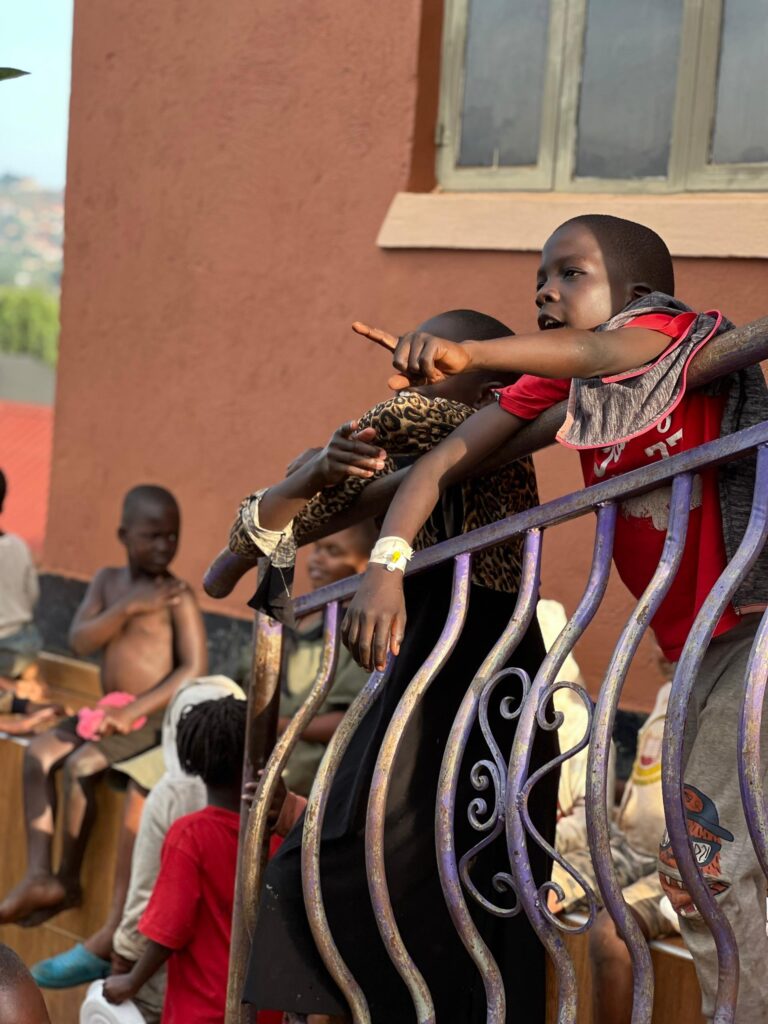Uganda’s child welfare system is failing. A country often celebrated for its breathtaking landscapes and rich cultural heritage is grappling with an unsettling reality. Shabani Chani is making a profound impact on the lives of homeless children in Uganda. Amidst the staggering challenges facing the country’s child welfare system, his dedication offers a ray of hope.
Over two million children in Uganda have been orphaned, left to navigate a harsh world where survival is not guaranteed. For many, the streets are both home and battlegrounds. Scavenging in trash heaps, dodging predators, and begging for scraps, these children endure a daily fight that most of us cannot fathom. Some fall into forced labour, others into early marriages, and countless more disappear into the shadows of the streets.
According to UNICEF, only one in four children under five has access to adequate care, and nearly 35% of primary-aged children drop out of school. Every day, the cycle tightens. Government programs, though ambitious on paper, fail to meet the sheer scale of demand. Nonprofits and aid organizations provide fragmented solutions, often too small or too fleeting to effect lasting change. And the gap—between those who need help and those equipped to offer it—continues to widen.
This is the backdrop against which social entrepreneurs like Shabani are stepping in, filling gaps that traditional systems have failed to address. Of course, not as a saviour but as a symbol of what is possible when love and action meet. “Change doesn’t happen when you ignore the problem,” he tells me during our interview. “It starts when you feel it in your heart, when the weight of it forces you to act.” He explains, “Our work is about survival and dignity; these kids need more than just food—they need a chance to dream.”
Today, Shabani cares for 70 children, offering them more than just food and shelter. He provides a sanctuary where they can learn, dream, and rebuild their shattered sense of self-worth.

The true cost of Uganda’s child welfare crisis isn’t measured in shillings or dollars. It’s in the untold stories of children who grow up without families, without education, and without hope. Studies show that children raised without adequate support are more likely to face mental health challenges or fall into cycles of poverty as adults. They become street children, often pulled into a vicious cycle of crime, exploitation, or worse.
Without intervention, this systemic neglect perpetuates itself, costing the nation untold human potential. “We’re losing a generation,” Shabani says. “Children with dreams, talents, and the capacity to change this country are being forgotten because they have no one to fight for them.”
Shabani shares the story of a boy he recently took in, who had spent years scavenging in garbage dumps to survive. “When he first came to us, he wouldn’t even make eye contact,” he recalls. “Now, he’s the brightest in his class and dreams of becoming a doctor. That’s the power of giving someone a second chance.”
Current Project: Build an Orphanage
Despite these efforts, Shabani faces significant challenges in expanding his project to accommodate more homeless children in Uganda. His rented home is overcrowded, and the lack of a permanent centre limits his ability to provide stability. “We’re still renting,” he tells me. “Without a permanent centre, we can’t create the stability these kids need. It’s not enough to give them food or clothes; they need a foundation for their dreams.” He dreams of creating a space (permanent orphanage) where these children can learn, grow, and dream without limitations.

Why This Matters Beyond Uganda
While Shabani’s story is uniquely Ugandan, it reflects a global issue. The United Nations estimates over 140 million orphans worldwide. While governments and NGOs play a critical role, grassroots initiatives like Shabani’s highlight the importance of localized solutions.
What sets his work apart is its focus on sustainability. “We’re not just feeding them,” he says. “We’re teaching them how to fish. Our goal is to help these kids build skills that will sustain them for life.”
This approach has gained international attention, with visitors from around the world coming to see Shabani’s work firsthand. Some have gone on to provide support, while others have shared his story, amplifying its impact.
How You Can Help
For those inspired by his work, the takeaway is clear: no act of kindness is too small. Whether through donations, volunteering, or simply spreading the word, everyone has a role to play in addressing this global crisis. In his words, “Love is the foundation of change. It’s not about how much you give; it’s about giving what you can with an open heart.” DONATE HERE.
Shabani’s Quest to Save a Generation

FAB: How has it been since we last spoke?
Sabani: The journey has been good so far. This year, we tried our best on our big achievements. We just read from the government, and everything is now organized. Recently, we launched our orphanage project, and as of now, we’re taking care of 70 children. Just yesterday, we hosted an event, and it was amazing. It was a very big achievement. Looking ahead, we’re planning to begin building our own orphanage this January or February. We already have the land, so once we secure the necessary support, we’ll be ready to start construction.
FAB: That’s great news! Last time, you mentioned plans to establish your orphanage, and it’s exciting to hear that you’ve secured land for it. And, of course, with the right support, you guys will erect a building. Can you tell us how the local community in Kampala has responded to your efforts over the past 12 months?
Sabani: Our work has truly touched many lives and showcased just how hard-working we are. As I mentioned before, our goal has always been to serve the community and change lives. Many people were surprised by what we’re doing but now hear good testimonies from people, not just locally in Uganda but internationally as well. Initially, it was hard to gain recognition, but over time, people started to see how serious and impactful our efforts are. Our actions have inspired many youth and even older people, establishing us as a symbol of greatness and hope in the community.
What’s even more amazing is the support and recognition we’ve received beyond Uganda. We’ve hosted guests from different countries who visited to see our work firsthand and joined us. They were impressed and even shared their own testimonies about the impact they witnessed. A lot of people couldn’t believe it, but now they know it is real. It’s heartwarming to know that our efforts are now being acknowledged on a global scale.

FAB: Let’s talk about the impact you’ve had on the children you’re helping. Are there any specific stories that have deeply inspired you recently? Moments where you’ve seen such significant changes in these children that made you think, ‘I have to keep going, no matter what.’ Are there any stories that stand out to you?
Sabani: Yes. Every kid is different and unique, and everyone is graced by talent, which was given by God. When we started, our approach was to genuinely love and understand each child—getting to know who they are and who they can become. Our focus is on finding their dreams and passions so that we can start teaching them and showing them the right way to make their dream come true.
FAB: That’s a very deep one, then. If you had unlimited resources at your disposal today, what immediate changes or initiatives would you implement to improve the lives of the children you support?
Sabani: Right now, our biggest challenge is not having our own building or centre because the centre is very important. A centre is important because it allows us to provide consistent education for the children every single day. If we have a big centre, we can be helping them every single day practice, collect them, and teach them. With a proper centre, we could nurture their talents and guide them in developing skills such as dance, football, or even entrepreneurship.
Every child has their own dream, and our goal is to fund their dream and to make it happen to save their future. It’s not just about feeding them every day. So we have to also help them learn how to fish, not just give them fish. It is a big challenge to us because we don’t know how we can manage that as we are still renting the house, so no centre, no work.
Sabani: The message I have is love. Love is an act of kindness, and kindness brings freedom. Through love, we can change the world and make the impossible possible. Love doesn’t necessarily mean having a lot; it’s about what you feel inside. When you love something, it motivates you to take action, and that action can create change. Every small act of love contributes to making a difference. Together, we can make the world a better place. It’s not just about money—it’s about love. Every single action of your love can contribute to our mission and our vision. Love is what will bring everything we need and transform lives. That’s the message I want to share with the world.
Shabani: What I would tell them is to believe in themselves and follow the passion in their hearts. Change starts when you feel it deeply inside—you can only change the world when it truly matters to you. Once you feel that calling, no one can stop you from pursuing it.
But it’s important to remember that nothing comes easy. They need to work hard and stay committed to their goals. And it’s not enough to just dream; they need to take action. Having a dream without taking action is just another form of failure. So, they must stand up, take action, and make their dreams a reality. Donate to Support Uganda’s Homeless Children.











